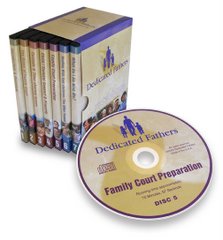TO HIRE OR NOT TO HIRE AN ATTORNEY
Part One of Two Parts
www.dedicatedfathers.org
Click here for more related stories
It has been said that a person who represents themselves has a fool for a client. If this is true, is it also true that a person who hires an attorney has fool in charge of their life?
In other words, you’re damned if you do and damned if you don’t. Therefore, you need to know when, why and how to hire an attorney.
In California, if you appear in court and represent yourself it is called going In Pro Per, which literally means “In one’s own proper person.” Some states call representing yourself Pro Se, which literally means “For one’s own behalf, in person.” No matter what your state may call it, it means you are representing yourself in court. Many people have handled their own family court case, with just a little help in doing the required legal paperwork.
If it appears your case will be routine or normal (meaning no known or expected surprises), and if there does not appear to be a lot of areas of serious disagreement between you and the other side, and if you are comfortable speaking in front of people, then a paralegal or support group can help you save a lot of money by assisting you in representing yourself.
Question?
What kind of people represent themselves?
Answer:
Most people represent themselves because they outright cannot afford an attorney. Some people represent themselves because they have been represented by an attorneys in the past and they now believe they can represent their own interests as well, if not better, than their previous attorneys. And there are those who represent themselves because they feel that even if they lose, they will have won by not having to pay the high costs of an attorney (some people believe just the fact of not paying an attorney is a “win”).
Reality is that many cases require an attorney. An example of a case requiring an attorney would be a case where there is a major confrontation over issues of custody and visitation and/or where there are serious differences over distribution of the community property. These kind of cases mandate an attorney and it would be prudent for you to retain the best attorney you can afford (of course there are those cases wherein you absolutely can not get the money together to hire an attorney. In those cases it is obviously better to represent yourself as best you can, rather than allow a default to be entered against you. In these situations, representing yourself will at least let you know for the rest of your life that you did all you could do).
However, whether or not you hire an attorney, it remains your responsibility to keep your case organized, to keep yourself updated on all happenings in your case, and to continually stay informed as to all facts
The following two sections are presented solely to assist you in determining whether or not you will want to attempt to represent yourself and, if you choose to involve an attorney, some guidelines to assist you in determining which attorney is best for you. You may want to check your state and local rules, regulations and procedures to discover whether the following notions are valid in your particular area.
If Going Pro Per / Pro Se (Representing Yourself)
1. If you can, get hooked up with a good nonprofit organization. The information and education about the local court system will be invaluable to you.
2. Visit the local family courthouse and observe the procedures in the courtroom. Divorce hearings are open to the public and you are allowed to go in and watch. Paternity actions are usually considered quasi-confidential hearings and therefore you probably would not be allowed to stay. However, the process and procedures are basically the same for both, so if you have a paternity action you can gain the information needed by observing a divorce hearing. While in the courtroom, take notes, study what is happening and why, check out how the judge reacts to certain questions or answers and observe communication styles of the different participants. If questions as to why you are there - tell them the truth, you have a hearing coming up and you wanted to see in advance what it was all about.
3. After the courtroom visit, meet with your advisor or coach to go over any questions which arose from your observation of the divorce proceedings.
4. No matter what happens during the process of representing yourself, never react to the situation. Take a moment to assess what is happening and then act upon it - never ever react. It is almost always fatal for us as males to react instead of proactively acting upon.
5. You and your case will survive the experience in much better shape if you stay out of the gutter, no mud slinging and no disparaging remarks - no matter what.
6. Your future lies in how strong and bold you are able to present your facts to the court, not in how well you react to the allegations from the other parent. Stay in your strength and power, be confident, self-assured and positive. Then, and only then, will you be able to walk away from this experience with your self-respect, self-worth and dignity still intact.
(continued)
BY: Marvin Chapman
www.dedicatedfathers.org
http://www.dedicatedfathers.org
Friday, December 29, 2006
To Hire or not To Hire an Attorney (Part 1)
Posted by
Dedicated Father
at
11:09 AM
![]()
Labels: child custody, collaborative divorce, divorce, family court, law, legal, mediation
Subscribe to:
Post Comments (Atom)



















No comments:
Post a Comment